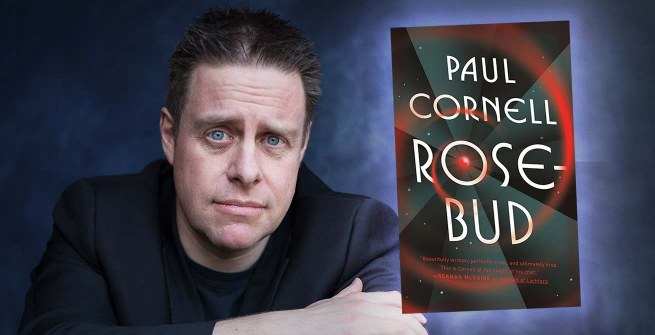Paul Cornell has written episodes of Elementary, Doctor Who, Primeval, Robin Hood and many other TV series, including his own children’s show, Wavelength. He’s worked for every major comics company, including his creator-owned series Saucer State for IDW and This Damned Band for Dark Horse, and runs for Marvel and DC on Batman and Robin, Wolverine and Young Avengers. He’s the writer of the Lychford rural fantasy novellas from Tor.com Publishing. He’s won the BSFA Award for his short fiction, an Eagle Award for his comics, a Hugo Award for his podcast, and shares in a Writer’s Guild Award for his Doctor Who. His latest novella is Rosebud and he recently talked about it with Daryl Maxwell for the LAPL Blog.
What was your inspiration for Rosebud?
I wanted to write something that tried to be in conversation with the incredible golden age of SFF we’re living through right now, and also to attempt to demonstrate I could pitch in and use hard science in my SF. I’m not just there for the spooky things in life. Also, comedy, because I don’t do comedy enough. It is, however, firmly in the tradition of my work that my wife calls ‘ha ha bang’, because it lures you in with fun and then gets all meaningful. I mean, it says so on the cover. And spaceships! I wanted to write a book with a spaceship on the cover. Turns out I still haven’t. But I can’t keep on putting spaceships in things until one shows up. Maybe I should write a book that was just spaceships talking to spaceships, then they’d have to put one on the cover. Maybe two!
Are Haunt, Diana, Bob, Huge, or Quin inspired by or based on specific individuals?
Oh God, no. Can you imagine being trapped in a lift with them? Well, one’s a sentient swarm of insects, so that alone would be a problem. Diana’s fun to be with, I guess.
How did the novella evolve and change as you wrote and revised it? Are there any characters or scenes that were lost in the process that you wish had made it to the published version?
I always chuck loads of words at anything short and end up throwing half of it away, and I threw it away because it was all bad.
You thank several people at the beginning of the novella for their physics advice. Did you have to do a bit of research regarding physics?
I thank one person for physics advice, and two for being sensitivity readers, and yes, that’s something I’m very proud of this time. Time crystals! I mean, I took a swing there at the hardest of SF items and only had to cloak the results in a slight drapery of comedy.
What was the most interesting or surprising thing that you learned during your research?
That if time crystals actually exist in this universe, things get seriously trippy. (What does ‘exist’ mean in this case? Discuss. Use both sides of the paper.) I was also able to use a lot of my own prior knowledge about human culture and art during the Ice Ages. (No, I wasn’t there.)
If you were able to choose a form/character for yourself, the way that the characters in Rosebud can, what would you choose?
Can I say Cary Grant? He’s from my part of the world originally, so it’s not that far a stretch. Geographically. Haunt, actually, is a lot like me, horribly, and so he gets quite a rough ride.
What’s currently on your nightstand?
A lamp. Why do you ask?
What is the last piece of art (music, movies, tv, more traditional art forms) that you've experienced or that has impacted you?
I’m listening to a lot of BBC speech radio as downloads now, and I’d say the twice-weekly episodes of "Free Thinking" on Radio 3 are where all culture lives. Also, I just finished Brian Michael Bendis’ run as writer of Superman, and he got the character so well I was cheering and crying and telling people about particular moments all the damn time.
What are you working on now?
I’m finishing a full-length SF novel and several comics projects. My fantasy rom-com graphic novel Three Little Wishes, about a contract lawyer and a fairy, is out this summer.

